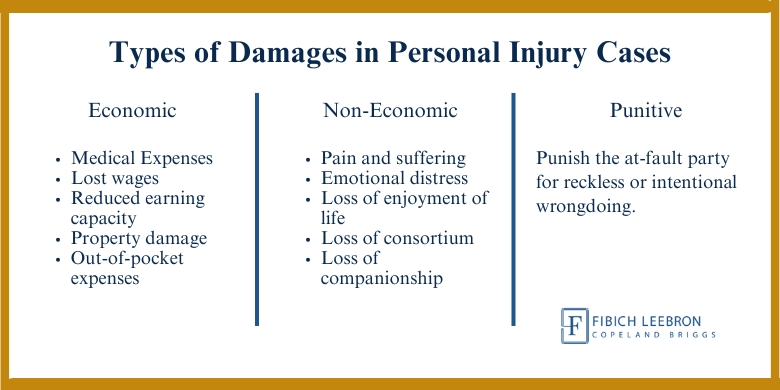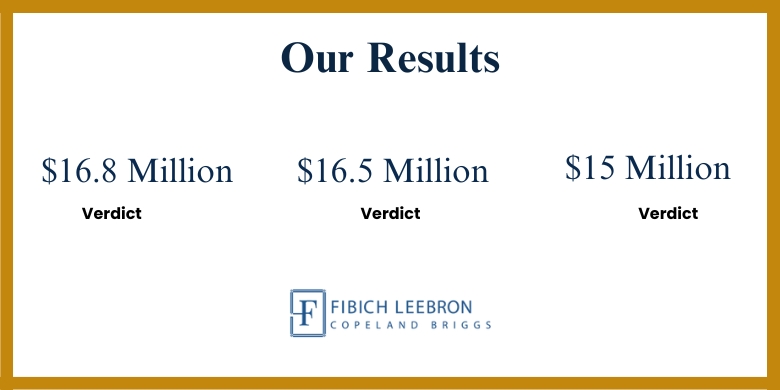Types of Damages Available in Personal Injury Cases
If you have physical and emotional injuries because of someone else’s carelessness or wrongdoing, you should not have to suffer financially as well. An injury caused by another can start an economic tsunami as medical bills pile up, work becomes impossible, and life as you knew it changes instantly. The good news is that Texas law allows you to seek multiple types of damages in personal injury cases.
At Fibich, Leebron, Copeland & Briggs, we have recovered millions of dollars in personal injury cases, encompassing a wide range of claims, from car and truck accidents to product liability lawsuits and work-related accident claims. If you or a loved one is suffering and wants to know if you could recover money to pay for medical care and other losses, contact our Houston personal injury attorneys today for a free consultation.
What Are Damages in a Lawsuit?
In personal injury claims, “damages” refers to the money a plaintiff (the injured person) can receive as compensation. These damages compensate for the physical, emotional, and financial suffering caused by someone’s reckless or harmful act. They can vary based on the case’s circumstances and the injury’s impact on the victim.
Types of Damages in Personal Injury Cases

In Texas, personal injury damages fall into three categories: economic, non-economic, and punitive. Each personal injury case is different, but many seek a combination of these three types of damages.
Economic Damages (Compensatory Damages)
Economic damages cover the actual financial costs of your injury — the things you can quickly put a price tag on. If an accident has left you struggling with medical bills or unable to work, these damages help relieve that burden. Some common examples include:
- Medical Expenses — Medical treatment is a significant cost in most personal injury cases. You can seek damages to cover everything from emergency room visits and surgeries to physical therapy and ongoing treatments.
- Lost Wages and Reduced Earning Capacity — If your injuries keep you from working, you can recover lost wages during your recovery period. Depending on the extent and severity of your injuries, you could also seek compensation for any future earnings you might miss out on.
- Property Damage — The most common example of property damage is a wrecked car, but it can include other losses in a personal injury case. You can seek repair or replacement value for cell phones, luggage, and other personal belongings.
- Out-of-pocket Expenses — You may receive other economic damages, such as money for transportation to and from medical appointments, home modifications for disability, and additional related costs.
Non-Economic Damages
Non-economic damages do not always come with a bill or receipt, but they are genuine losses for which you deserve compensation. Non-economic damages are meant to compensate for an injury’s emotional and personal toll on your life, including:
- Pain and Suffering — This includes chronic pain, ongoing discomfort, and the ways your injuries affect your daily life.
- Emotional Distress — This covers anxiety, depression, post-traumatic stress disorder (PTSD), and the psychological impact of your injury.
- Loss of Enjoyment of Life — You could seek compensation if your injuries prevent you from participating in activities you once loved.
- Loss of Consortium or Companionship — This refers to the strain an injury places on relationships, particularly with a spouse or family members.
Our past settlement examples in Texas show just how much these damages can vary. The following are a few of our firm’s case results that highlight the importance of building a strong case and getting help from an experienced personal injury lawyer:
- An 8-figure settlement for a product liability case (the exact amount is confidential)
- A 7-figure settlement for a sexual assault case
- $6 million for wrongful death
- $4.9 million settlement for a commercial vehicle accident
Punitive Damages (Exemplary Damages)
Punitive damages are different from economic and non-economic damages. Punitive or exemplary damages punish the at-fault party for reckless or intentional wrongdoing. They are also awarded to discourage others from making the same harmful, careless, or illegal choices.
Punitive damages are less common, but the court may award them in certain cases. Texas law caps punitive damages at the greater of $200,000 or twice the amount of economic damages, plus an equal amount of non-economic damages, up to a maximum of $750,000.
How Pain and Suffering Damages Are Calculated in Texas
While it is straightforward to calculate economic damages, such as medical bills or lost wages, pain and suffering damages do not have a precise dollar amount associated with them. Insurance companies and courts consider multiple factors when determining how much to award for pain and suffering. They determine a dollar amount based upon:
- Severity of the Injuries — More severe injuries often result in higher compensation since your emotional and physical distress would logically be greater.
- Duration of Pain and Treatment – Long-term pain and the need for ongoing care increase settlement values.
- Impact on Daily Activities — You may receive more if you are disabled and can no longer work, enjoy hobbies, or live independently.
- Emotional Trauma — Your mental health struggles caused by an injury also play a role in the compensation you could receive.
There are two standard methods that insurers and lawyers use to calculate pain and suffering (the courts are not bound by these methods and may make any determination they wish):
- The Multiplier Method — This method calculates pain and suffering by multiplying your total economic damages (such as medical bills and lost wages) by a number, usually between 1.5 and 5. The more severe and long-lasting your injury, the higher the multiplier will be.
- The Per Diem Method — This approach assigns a daily dollar amount to your pain and suffering, often based on your daily earnings. The court or insurer multiplies this rate by the number of days you are expected to experience pain and hardship due to your injury.
Factors That Affect Your Personal Injury Settlement in Texas
Every case is unique, and many factors can influence the final settlement amount, including:
- Cap on Non-Economic Damages — Texas places limits (caps) in medical malpractice cases. You cannot recover more than $250,000 in non-economic damages from each doctor or medical center. You also cannot collectively recover more than $500,000 from all medical facilities.
- Fault — Texas follows a modified comparative negligence rule, which means your compensation is reduced if you were partially responsible for the accident. You can’t recover damages if you are more than 50 percent at fault.
- Insurance Policy Limits — The at-fault party’s insurance coverage affects how much compensation is available. The insurer may offer less than the policy limit, but cannot offer more.
- Severity of Injuries — More serious injuries, such as spinal cord damage or traumatic brain injuries, usually result in higher settlements.
- Medical Treatment and Prognosis — If your injuries require long-term care, your settlement should reflect future medical expenses.
- Legal Representation — A skilled attorney can often strengthen your claim and improve your chances of receiving fair and potentially higher compensation in your Houston personal injury case.

People Also Asked
1.What are the three types of damages in a personal injury lawsuit?
The three primary types of damages in a personal injury lawsuit are economic, non-economic, and punitive.
2. What qualifies as pain and suffering in Texas?
Pain and suffering include physical pain, emotional distress, and loss of enjoyment of life due to an injury.
3. How much can you get for pain and suffering in Texas?
There is no set amount, as it depends on the severity of the injury, how it impacts your life, and the specific circumstances of your case.
4. Are there limits on personal injury damages in Texas?
Texas places caps on punitive damages in all cases and non-economic damages in medical malpractice cases, but not in most other personal injury claims.
How a Houston Personal Injury Lawyer Can Help You Seek Maximum Compensation
An experienced personal injury attorney can advocate for your rights, build a strong case, and negotiate for the maximum compensation you deserve. Here’s how they can help accident victims:
- Investigate Your Case — Gather evidence, speak with witnesses, and review accident reports.
- Determine Who Is At Fault — Identify those responsible for your injuries and losses by examining evidence, consulting with experts, and using other legal strategies.
- Calculate Full Damages — Assign a value to your losses by assessing medical costs, lost wages, pain and suffering, and future expenses.
- Negotiate with Insurance Companies — Stand up to insurers who try to deny or downplay your claim or offer lowball amounts that won’t cover your losses.
- File a Lawsuit if Necessary — Take your case to court if a fair settlement cannot be reached through negotiations.
Contact Our Houston Injury Attorneys for Help
With over 100 years of combined experience, our nationally recognized attorneys have a proven track record of helping clients secure compensation after serious accidents. For many decades, Fibich, Leebron, Copeland & Briggs has fought for the rights of the injured, bringing deep knowledge and dedication to every case.
Three attorneys at our personal injury law firm are Board Certified by the Texas Board of Legal Specialization. Founding Partner Tommy Fibich holds board certification in Civil Trial Law, while attorney Russell Briggs is board-certified in Personal Injury Trial Law. With the resources and experience to take on even the most complex cases, from industrial explosions to wrongful death claims, our legal team is ready to fight for you.
If you or a loved one was injured due to someone else’s negligence, don’t wait to get the help you deserve. Contact us today for a free consultation.